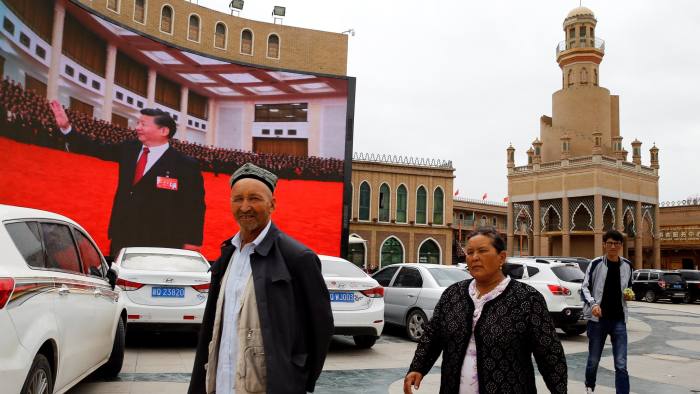China crackdown on Muslims spreads beyond Xinjiang province

Financial Times, 2 December 2018
 By Shohret Hoshur China’s crackdown on Muslims in Xinjiang province has spread to Ningxia, signalling a hardening in Beijing’s management of ethnic and religious groups.
By Shohret Hoshur China’s crackdown on Muslims in Xinjiang province has spread to Ningxia, signalling a hardening in Beijing’s management of ethnic and religious groups.
Authorities began a security clampdown in Xinjiang last year, detaining at least 1m Muslim Uighurs in internment centres, a move that has drawn international condemnation . China’s leaders said the detentions were necessary and have recast them as “vocational education” facilities.
Efforts by Beijing to broaden its control over China’s ethnic minorities were highlighted last week when Ningxia signed a counter-terrorism co-operation agreement with Xinjiang.
Zhang Yunsheng, a senior Ningxia party official, has praised Xinjiang’s counter-terrorism efforts, calling on his province to “better integrate with Xinjiang” and to “strengthen the deep co-operation between the two places in antiterrorism, social stability, and ethnic religion”.
Mr Zhang’s entourage last month visited an internment centre in Urumqi, the provincial capital, as well as two Xinjiang prisons, according to the Legal Daily, a newspaper managed by the Communist party’s political and legal commission.
The high-level exchange has paved the way for the export of Xinjiang’s techniques to Ningxia, home to the largest concentration of the Muslim Huis, one of China’s largest ethnic minority groups numbering more than 10m.
Even before the agreement, there had been tight religious restrictions in Ningxia. This summer, residents in Weizhou gathered in a rare protest over the planned demolition of the city’s recently completed Grand Mosque. Religious classes for children have been suspended region-wide since February while Islamic symbols and halal signs have been removed as part of a campaign to “Sinocise” Islam.
“The Hui, for the most part, are extremely well integrated economically and socially. They have been well entrenched in China since the 12th century,” said Reza Hasmath, a political science professor at the University of Alberta.
Beijing’s hardening religious approach also amounts to a tacit admission that its decades-old ethnic policy, aimed at replicating the country’s economic success among ethnic minorities, has failed.
In the early days of Communist party rule, the largest ethnic groups, including Muslim Huis and Uighurs, were allocated “autonomous regions” where they were promised a higher degree of independence in governing religious and cultural affairs.
Minority groups were also exempted from the country’s former one-child policy and continue to receive preferential access to certain social welfare benefits, particularly in education.
But under Chen Quanguo, the hardline party secretary of Xinjiang who formerly governed Tibet, China’s two largest autonomous regions have been heavily policed.
James Leibold, an expert on ethnic policy at Melbourne’s La Trobe University, said there used to be a “belief that economic development will ultimately solve the ethnic question: if you bring development to the frontier, people will be gracious and loyal to the party”.
“There is a belief now,” he added, “that that approach has failed and what is required is a far more coercive or assertive approach, one that puts stability first even if it means sidelining economic development”.
https://www.ft.com/content/08b19a76-f389-11e8-ae55-df4bf40f9d0d

